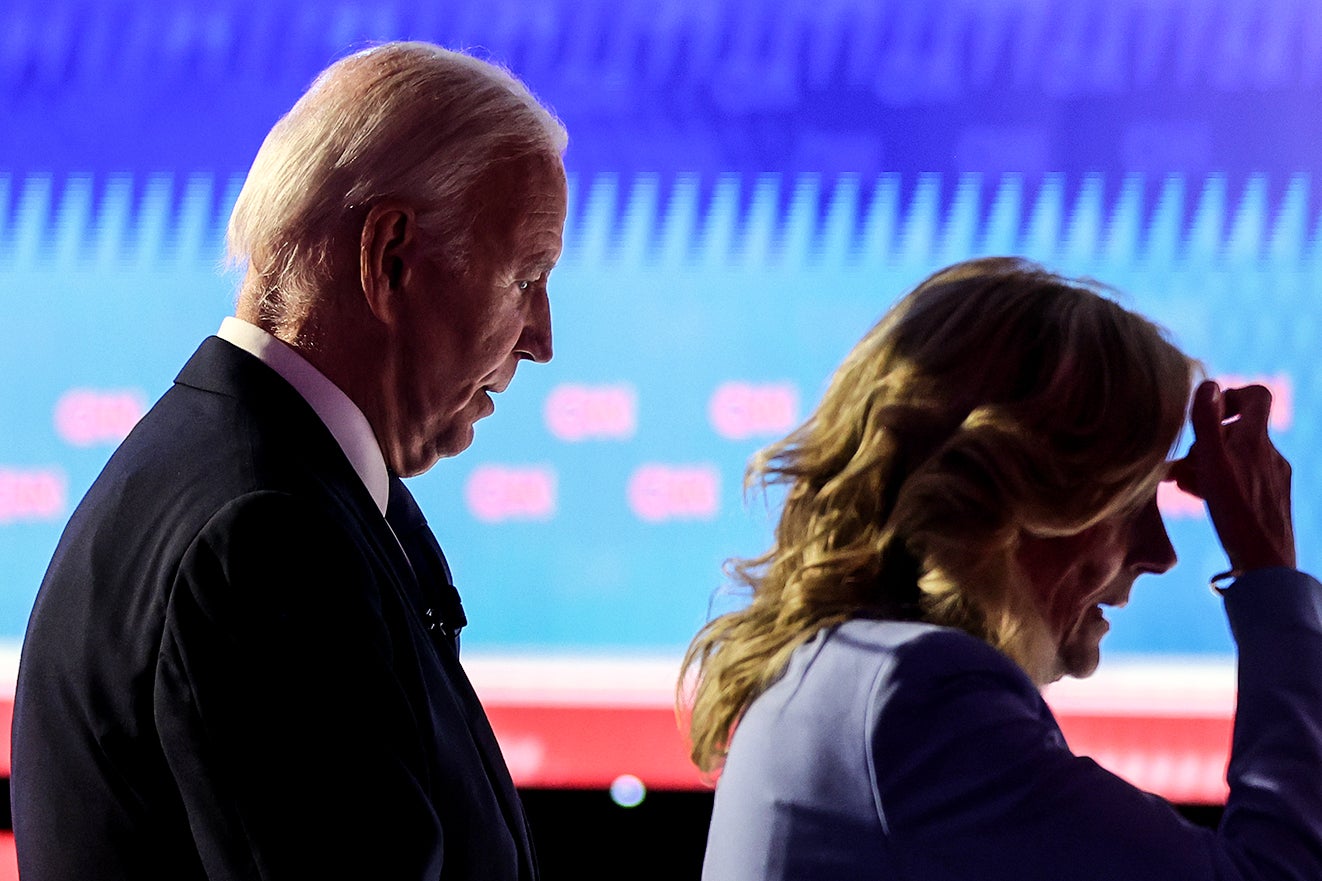There are times in all of our lives when we see things we wish we hadn’t. It could be a text, sent or received by a loved one, that reveals a secret. It could be a bill or bank statement, left out at a friend’s house, that tells a different financial story than what you thought you knew about your friend. It could be a shitty test result, confirming something you’d previously been able to deny.
Or it could be last Thursday’s presidential debate, which revealed that President Biden is indeed an old man who appears to be in no condition to be running this country, even now—not to mention in another four years.
The debate was shocking, upsetting, nearly impossible to watch. Based on my anecdotal research, lots of folks turned it off after 10 minutes, unable to witness the humiliating performance by our current president. Others held out hope it would turn around in real time, that Biden’s jaw would be vacuumed shut again, eyes refocused. Still more of us had the sinking, correct assumption: This would not come to pass. We knew what was happening. We were watching the president of the United States, un-teleprompted, fail in a spectacularly human way in front of us. He was not OK. Which meant the impending presidential election was more like an impending disaster.
But even worse than those unbearable 90 minutes has been the spin that followed. Democratic operatives and Biden’s friends in high places came to his defense; Barack Obama himself brushed off the president’s dismal performance, posting on Twitter that “bad debate nights happen.” C’mon. Yes, a bad debate night happened to Obama when he was running again in 2012. A bad debate night is not what happened last week.
Pushing this line is offensive, and contemptuous of the American voting public. Everyone saw the same debate: It was reality rubbing human mortality in our faces. Biden is old, and the process of his aging seems to be accelerating, as it is wont to do. We all know old people. We know how different the 60s are from the 70s, and the 70s are from the 80s. We’ve all witnessed the decline that comes in the slow march toward the end, likely in circumstances that were unbelievably personal and sorrowful. What I am trying to say is: We know what we saw last Thursday. And like those relationship-changing texts and bad test results, we cannot unsee what we saw.
The effort to convince us that it really wasn’t that bad will continue. Biden’s campaign will keep reiterating that those closest to the president—his wife Jill and son Hunter, first and foremost—are standing by him, urging him to stay in, because they are the ones who know what he is “really” like, and they think he’s up for it. But the swell from the media is building to counter that, and that’s good. It’s our job to say what is really happening out there, even if it is unpleasant and inconvenient.
Could we have been more forcefully pushing on Biden’s age before? Sure, and some reporters have been trying. But even with the evidence of the number—Biden is 81—pressing too hard seemed to be edging into a hypothetical space. He seemed good; the State of the Union was a success, he looked invigorated at rallies. Only now does it feel so obvious that in those encounters, Biden was scripted, prompted, controlled. Everything mediated by people motivated to protect him personally and politically. Now, we regular folks have seen him unplugged. It’s not pretty. Aging only goes in one direction.
On Friday morning, my 78-year-old mom, a rational, registered independent in Pennsylvania, texted me: “We are not Trump fans, but poor Biden was so bad last night… I felt sorry for the man.” That is kindness from a fellow senior citizen. But I felt rage, and still do. My anger isn’t even really at Biden himself. I am mad at the Democratic Party, which seems to truck along with a mission of its own while remaining wedded to the past. I know what it feels like for voters to be energized by their candidate. Remember 2008? It was seemingly against all odds that Barack Obama became the Democratic nominee, beating Hillary Clinton who … then became the predetermined candidate in 2016. And that time, the energy was different. I got on board and voted for her, don’t get me wrong. But everything about that candidacy was locked down. There was little room for a prospective challenger. Bernie Sanders, whose candidacy I dismissed too easily (because I thought he was too old!) and Martin O’Malley (remember him?) were the only two to step up. It was Hillary’s turn. We got with the program. And then we lost.
Now, we are being urged again to get on board and do this thing. Finish the job! We need to go with the guy with the record, with the experience, with the delegates. He beat Trump before—no one else has done that, don’t you realize that? No one else can do that, Biden defenders keep telling us.
Well, who knows. But I do know that trying to wish last Thursday night away is only going to make me angrier. I’m up for rolling the dice. We can’t unsee what we saw. And I, for one, don’t want to see it again.
